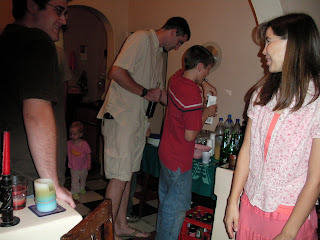




As Thanksgiving approached this year I decided the best way to celebrate would be to introduce my friends and colleagues to a Canadian Thanksgiving. Seeing as how I am the only Canadian in the area I figured it was up to me to take on this task.
I really wanted to get a turkey this year but they are few and far between and I didn’t know if it would be possible. Fortunately, one my colleagues knew someone who had been raising turkeys and was ready to sell them. I arranged to have a turkey delivered to my office. Naturally, it was still alive and I decided a fight with a live turkey was probably not a good plan. The man who delivered it came with me and we brought it in my car to my house where he killed it in the backyard. Then my house worker was able to pluck it and clean it for me. I froze it as this was a couple weeks before Thanksgiving.
When Thanksgiving weekend came around (we celebrated on Saturday, Oct 10 because Monday is not a holiday here), I had approximately 25 adults and 11 children crammed into my little house! Fortunately we had a potluck style meal where everyone contributed part of the meal. My housemate and I had to borrow chairs in order to have enough seats for everyone. We spent part of the afternoon arranging and fitting them just right in our living room, like a puzzle. Otherwise we would not have had space for all of them. We needed every single chair too! There were people from Egypt, England, the States, Australia, New Zealand and Holland. It was definitely an international Thanksgiving!
One of the best parts of the evening (besides eating the turkey) was listening to everyone share something they were thankful for. Sometimes doing this can be a little superficial depending on what people say, but it was actually quite meaningful. It was encouraging to hear all the different things people appreciate. We all come from such different backgrounds, from different parts of the world and yet we can sit together and honour God because of everything we have to be thankful for.







